| Pinkerton Government Services, Inc. from Wikipedia
Pinkerton Government Services, Inc., founded as the Pinkerton
National Detective Agency, usually shortened to the Pinkertons, is a private
security guard and detective agency established in the U.S. by Allan Pinkerton
in 1850 and currently a subsidiary of Securitas AB. Pinkerton became famous
when he claimed to have foiled a plot to assassinate president-elect Abraham
Lincoln, who later hired Pinkerton agents for his personal security during
the Civil War. Pinkerton's agents performed services ranging from security
guarding to private military contracting work. At its height, the Pinkerton
National Detective Agency employed more agents than there were members
of the standing army of the United States of America, causing the state
of Ohio to outlaw the agency due to fears it could be hired as a private
army or militia. Pinkerton was the largest private law enforcement organization
in the world at the height of its power.
During the labor unrest of the late 19th century and early
20th century, businessmen hired the Pinkerton Agency to provide agents
that would infiltrate unions, to supply guards to keep strikers and suspected
unionists out of factories, and sometimes to recruit goon squads to intimidate
workers. The best known such confrontation was the Homestead Strike of
1892, in which Pinkerton agents were called in to enforce the strikebreaking
measures of Henry Clay Frick, acting on behalf of Andrew Carnegie, who
was abroad; the ensuing conflicts between Pinkerton agents and striking
workers led to several deaths on both sides. The Pinkertons were also used
as guards in coal, iron, and lumber disputes in Illinois, Michigan, New
York, and Pennsylvania, as well as the Great Railroad Strike of 1877.
The company now operates as Pinkerton Consulting and Investigations,
a division of the Swedish security company Securitas AB, although its government
division is still known as Pinkerton Government Services. The organization
was pejoratively called the "Pinks" by the outlaws and opponents.
Origins
| In the 1850s, Allan Pinkerton met Chicago attorney Edward
Rucker in a local Masonic Hall and formed the North-Western Police Agency,
later known as the Pinkerton Agency.
Historian Frank Morn writes: "By the mid-1850s a few businessmen
saw the need for greater control over their employees; their solution was
to sponsor a private detective system. In February 1855, Allan Pinkerton,
after
consulting with six midwestern railroads, created such an agency in Chicago."
Government work
n 1871, Congress appropriated $50,000 to the new Department
of Justice (DOJ) to form a suborganization devoted to "the detection and
prosecution of those guilty of violating federal law." The amount was insufficient
for the DOJ to fashion an integral investigating unit, so the DOJ contracted
out the services to the Pinkerton National Detective Agency. |
.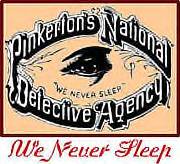 |
| However, since passage of the Anti-Pinkerton Act in 1893,
federal law has stated that an "individual employed by the Pinkerton Detective
Agency, or similar organization, may not be employed by the Government
of the United States or the government of the District of Columbia."
Chicago "Special Officers" & Watchmen
In the 1870s, Franklin B. Gowen, then president of the
Philadelphia and Reading Railroad hired the agency to investigate the labor
unions in the company's mines. A Pinkerton agent, James McParland, infiltrated
the Molly Maguires using the alias James McKenna, leading to the downfall
of the labor organization. The incident was the inspiration for Arthur
Conan Doyle's Sherlock Holmes novel The Valley of Fear. A Pinkerton agent
also appears in a small role in The Adventure of the Red Circle, another
Holmes story. A 1970 film The Molly Maguires was loosely based upon it
as well, starring Richard Harris, Sean Connery and Anthony Zerbe. |
.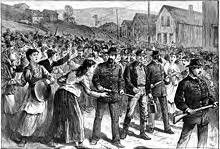
Pinkerton guards escort strikebreakers
in Buchtel, Ohio, 1884 |
| Homestead Strike
During the Homestead Strike, the arrival, on July 6, 1892,
of a force of 300 Pinkerton detectives from New York and Chicago, who were
called in by Carnegie Steel's Henry Clay Frick to protect the Pittsburgh
area mill and strikebreakers, resulted in a fire fight and siege in which
16 men were killed
(7 Pinkertons and 9 strikers); to restore order two brigades
of the Pennsylvania militia were called out by the Governor.
As a legacy of the Pinkerton's involvement a bridge connecting
the nearby Pittsburgh suburbs of Munhall, Pennsylvania and Rankin, Pennsylvania
was named Pinkerton's Landing Bridge.
Detective Frank P. Geyer
In 1895 detective Frank Geyer tracked down the three murdered
Pitezel children leading to the eventual trial and execution of the United
States' first known serial killer H. H. Holmes. His story is told in his
self-written book, The Holmes-Pitezel Case. Pinkertons had previously apprehended
Holmes in 1894 in Boston on an outstanding warrant for insurance fraud
perpetrated in Chicago.
Steunenberg murder and trial
Harry Orchard was arrested by the Idaho police and confessed
to Pinkerton agent James McParland that he assassinated former Governor
Frank Steunenberg of Idaho in 1905. Orchard testified (unsuccessfully)
under threat of hanging against Western Federation of Miners president
Big Bill Haywood, naming him as hiring the hit. With a stirring defense
by Clarence Darrow, Haywood and the other defendants of the WFM were acquitted
in a nationally publicized trial. Orchard received a death sentence, but
it was commuted.
|
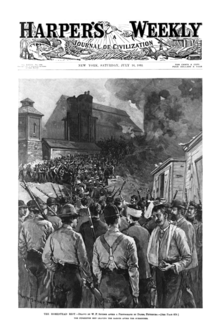
Pinkerton men leaving a barge after
their surrender during the
Homestead Strike |
Outlaws and competition
Pinkerton agents were hired to track western outlaws Jesse
James, the Reno Gang, and the Wild Bunch (including Butch Cassidy and the
Sundance Kid). On March 17, 1874, two Pinkerton Detectives and a Deputy
Sheriff Edwin P. Daniels encountered the Younger Brothers (associates of
the James-Younger gang); Daniels, John Younger, and one Pinkerton Agent
was killed. In Union, Missouri a bank was robbed by George Collins aka
Fred Lewis and Bill Randolph; Pinkerton Detective Chas Schumacher trailed
them and was killed. Collins was hanged March 26, 1904 and Randolph was
hanged May 8, 1905 in Union, Mo. Pinkertons were also hired for transporting
money and other high quality merchandise between cities and towns, which
made them vulnerable to the outlaws. Pinkerton agents were usually well
paid and well armed.
G.H. Thiel, a former Pinkerton employee, established the
Thiel Detective Service Company in St. Louis, Missouri, a competitor to
the Pinkerton agency. The Thiel company operated in the U.S., Canada, and
Mexico.
Due to its conflicts with labor unions, the word Pinkerton
continues to be associated by labor organizers and union members with strikebreaking.
Pinkertons, however, moved away from labor spying following revelations
publicized by the La Follette Committee hearings in 1937. Pinkerton's criminal
detection work also suffered from the police modernization movement, which
saw the rise of the Federal Bureau of Investigation and the bolstering
of detective branches and resources of the public police. Without the labor
and criminal investigation work on which Pinkertons thrived for decades,
the company became increasingly involved in protection services, and in
the 1960s, even the word "Detective" disappeared from the agency's letterhead.
In July 2003, Pinkerton's was acquired along with longtime rival, the William
J. Burns Detective Agency (founded in 1910), by Securitas AB to create
Securitas Security Services USA, Inc., one of the largest security companies
in the world. Securitas employees are currently looking to form a union
through the SEIU (Services Employees International Union).
|
| Allan Pinkerton from Wikipedia
Allan Pinkerton (25 August 1819 – 1 July 1884) was a Scottish
American detective and spy, best known for creating the Pinkerton National
Detective Agency.
Early life, career and immigration
| Pinkerton was born in the Gorbals, Glasgow, Scotland,
to William Pinkerton and his wife, Isobel McQueen, on August 25, 1819.
The location of the house where he was born is now occupied by the Glasgow
Central Mosque.[citation needed] A cooper by trade, he was active in the
British Chartist movement as a young man. Pinkerton married Joan Carfrae
(a singer) in Glasgow on 13 March 1842 secretly before moving to
America. Disillusioned by the failure to win suffrage, Pinkerton emigrated
to the United States in 1842, at the age of 23.
In 1843, Pinkerton heard of Dundee, Illinois, fifty miles
northwest of Chicago on the Fox River.[3] He built a cabin and started
a cooperage there, sending for his wife in Chicago after the cabin was
complete. As early as 1844, Pinkerton worked for Chicago Abolitionist leaders,
and his Dundee home was a stop on the Underground Railroad.
In 1849 Pinkerton was appointed as the first detective
in Chicago. In the 1850s, he partnered with Chicago attorney Edward Rucker
in forming the North-Western Police Agency, later known as the Pinkerton
National Detective Agency and is still in existence today as Pinkerton
Consulting and Investigations, a subsidiary of Securitas AB. Pinkerton's
business insignia was a wide open eye with the caption "We never sleep."
As the United States expanded in territory, rail transportation increased.
Pinkerton's agency solved a series of train robberies during the 1850s,
first bringing Pinkerton into contact with George McClellan and Abraham
Lincoln.
|
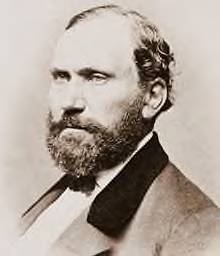
Allan Pinkerton
born August 25, 1819
Glasgow, Scotland
died July 1, 1884 (aged 64) |
American Civil War
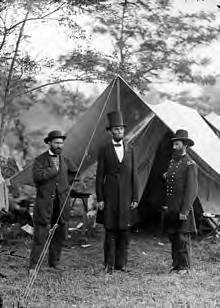 .. ..
Pinkerton (left) with Abraham Lincoln
and Major General John A. McClernand. |
Prior to his service with the Union Army, he developed[citation
needed] several investigative techniques that are still used today. Among
them are "shadowing" (surveillance of a suspect) and "assuming a role"
(undercover work). Following the outbreak of the Civil War, Pinkerton served
as head of the Union Intelligence Service in 1861–1862 and foiled an alleged
assassination plot in Baltimore, Maryland, while guarding Abraham Lincoln
on his way to his inauguration. His agents often worked undercover as Confederate
soldiers and sympathizers, in an effort to gather military intelligence.
Pinkerton served in several undercover missions under the alias of Major
E.J. Allen. Pinkerton was succeeded as Intelligence Service chief by Lafayette
Baker. The Intelligence Service was the forerunner of the U.S. Secret Service.
Postbellum
Following Pinkerton's service with the Union Army, he
continued his pursuit of train robbers, such as the Reno Gang and the famous
outlaw Jesse James. He was originally hired by the railroad express companies
to track down James, but after Pinkerton failed to capture him, the railroad
withdrew their financial support and Pinkerton continued to track James
at his own expense. After James allegedly captured and killed one of Pinkerton's
young undercover agents, who was foolish enough to gain employment at the
farm neighboring the James farmstead, he finally gave up the chase. Some
consider this failure Pinkerton's biggest defeat. He also sought to oppose
labor unions. In 1872, the Spanish Government hired Pinkerton to help suppress
a revolution in Cuba which intended to end slavery and give citizens the
right to vote. If Pinkerton knew this, then it directly contradicts statements
in his 1883 book The Spy of the Rebellion, where he professes to be an
ardent Abolitionist and hater of slavery. |
| Allan Pinkerton died in Chicago on July 1, 1884. It is
famously claimed that the reason was a convoluted accident in which Pinkerton
slipped on the pavement and bit his tongue, resulting in deadly gangrene.
However, reports of the time give different conflicting causes such as
Pinkerton succumbing to a stroke (he had survived another one year earlier)
or to malaria he had contracted during a trip to the Southern United States.
At the time of his death, he was working on a system that would centralize
all criminal identification records, a database now maintained by the Federal
Bureau of Investigation.
Pinkerton is buried in Graceland Cemetery, Chicago. He
is a member of the Mititary Intelligence Hall of Fame. |
.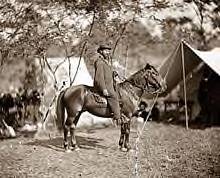
Pinkerton on horseback
on the Antietam Battlefield in 1862. |
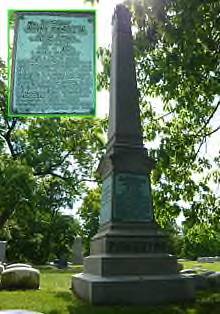 . .
Pinkerton's Tomb, Graceland Cemetery,
Chicago. |
Legacy
After his death, the agency continued to operate and soon
became a major force against the labor movement developing in the United
States and Canada. This effort changed the image of the Pinkertons for
years. They were involved in numerous activities against labor during the
late 19th and early 20th centuries, including:
The Homestead Strike (1891)
The Pullman Strike (1894)
The Wild Bunch Gang (1896)
The Ludlow Massacre (1914)
The La Follette Committee (1933–1937)
Many labor sympathizers accused the Pinkertons of inciting
riots in order to discredit unions and justify police crackdowns.[citation
needed] The Pinkertons' reputation was harmed by their protection of replacement
workers ("scabs") and the business property of the major industrialists,
including Andrew Carnegie.
Despite his agency's later reputation for anti-labor activities,
Pinkerton himself was heavily involved in pro-labor politics as a young
man. Though Pinkerton considered himself pro-labor, he opposed strikes
and distrusted labor unions. |
Pinkerton was so famous that for decades after his death,
his surname was a slang term for a private eye. Due to the Pinkerton Agency's
conflicts with labor unions, the word Pinkerton remains in the vocabulary
of labor organizers and union members as a derogatory reference to authority
figures who side with management.[citation needed]
Pinkerton's exploits were in part the inspiration of the
1961 NBC western television series, Whispering Smith, starring Audie Murphy
and Guy Mitchell.
|
.
All articles submitted to the "Brimstone
Gazette" are the property of the author, used with their expressed permission.
The Brimstone Pistoleros are not
responsible for any accidents which may occur from use of loading
data, firearms information, or recommendations published on the Brimstone
Pistoleros web site. |
|